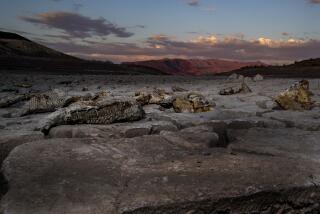Global warming could worsen Africa’s droughts
- Share via
Megadroughts lasting centuries are part of the normal weather pattern in sub-Saharan Africa, researchers reported Friday, a finding they say bodes ill for what could happen if the effects of global warming are added in.
Scientists have said they fear that climate change could lead to severe droughts that would further destabilize struggling African countries, but researchers from the universities of Texas and Arizona say droughts even more severe than those predicted are relatively common on the continent. Extreme droughts lasting at least a decade or two have occurred every 35 to 60 years on the continent for the last 3,000 years, the researchers reported in the journal Science. But interspersed with those are droughts that lasted centuries, they found.
The last such megadrought began in 1400 and lasted until about 1750, according to the scientists. The infamous drought in the Sahel region pales in comparison, they said. That drought lasted from the early 1960s into the 1970s, killing 100,000 people and displacing hundreds of thousands more.
Global warming could make drought periods longer and hotter, scientists said. “This could be devastating,” geoscientist and report coauthor Jonathan T. Overpeck of the University of Arizona said in a telephone news conference.
The authors reached their conclusions by studying the 3,000-year climate record contained in sediment layers on the bottom of Lake Bosumtwi in Ghana, about 20 miles southeast of the country’s second-largest city, Kumasi.
The ratio of oxygen-18 to oxygen-16 isotopes in the soil, along with the concentration of various elements washed into the lake during dry periods, provided an accurate record of annual rainfall. The scientists also studied the rings in trees that started growing in the lake during periods of low water.
The researchers found that recent data from Lake Bosumtwi correlate well with the 350-year record available for changes in sea-surface temperature in the Atlantic Ocean.
They concluded that the droughts are linked to a 60-to-80-year cycle of temperature changes in the North Atlantic called the Atlantic Multidecadal Oscillation.
--






